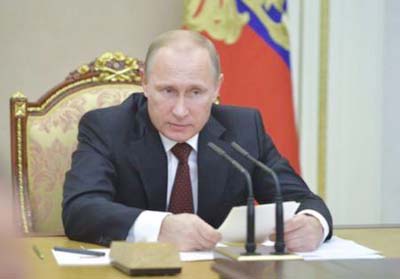
Reuters, Washington :
When Russians crossed the border to fight with rebels in eastern Ukraine earlier this year, Moscow said the soldiers had not been deployed but had gone on their own vacation time.
When Estonia was the victim of a cyber attack in 2007 and blamed Moscow, the Kremlin responded that it could not always control patriotic Russian hackers.
Western strategists who built their defenses to counter a massive invasion, nuclear missiles or terrorism are still trying to work out how to cope with this sort of threat that disrupts and destabilizes from behind a mask of deniability.
After soldiers without insignia took control in Crimea last March, Western military officials developed their own nickname for Russian personnel operating in unmarked uniforms or in plainclothes: Little Green Men.
NATO is considering how to counter such “ambiguous warfare” techniques should Russian President Vladimir Putin try something similar in the Baltic member states of Lithuania, Latvia and Estonia.
It has deployed some U.S. and allied tanks and planes there to signal NATO’s commitment to defend all its members with force and is considering bolstering police there, perhaps with officers from Nordic states, to help detect any Russian infiltration.
Military experts say Russia’s unconventional strategy on its western flank, especially in non-NATO member Ukraine, is proving remarkably effective, and it has recently been combined with a global show of force on a scale not seen since the Cold War.
When Russians crossed the border to fight with rebels in eastern Ukraine earlier this year, Moscow said the soldiers had not been deployed but had gone on their own vacation time.
When Estonia was the victim of a cyber attack in 2007 and blamed Moscow, the Kremlin responded that it could not always control patriotic Russian hackers.
Western strategists who built their defenses to counter a massive invasion, nuclear missiles or terrorism are still trying to work out how to cope with this sort of threat that disrupts and destabilizes from behind a mask of deniability.
After soldiers without insignia took control in Crimea last March, Western military officials developed their own nickname for Russian personnel operating in unmarked uniforms or in plainclothes: Little Green Men.
NATO is considering how to counter such “ambiguous warfare” techniques should Russian President Vladimir Putin try something similar in the Baltic member states of Lithuania, Latvia and Estonia.
It has deployed some U.S. and allied tanks and planes there to signal NATO’s commitment to defend all its members with force and is considering bolstering police there, perhaps with officers from Nordic states, to help detect any Russian infiltration.
Military experts say Russia’s unconventional strategy on its western flank, especially in non-NATO member Ukraine, is proving remarkably effective, and it has recently been combined with a global show of force on a scale not seen since the Cold War.

